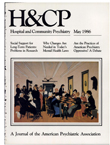Ten-Year Follow-up of Drug Abusers With Acute or Chronic Psychosis
Abstract
To assess whether long-term outcome of former drug abuse patients who had psychotic symptoms was related to duration of psychosis before hospitalization, the authors rated the psychiatric, occupational, and residential outcome of 101 former drug abuse patients based on interviews conducted ten years after their admission to a psychiatric hospital. At admission, 45 had had psychotic symptoms for six months or more; 26 had had psychotic symptoms for less than six months; and 30 had not been psychotic. Seventy-one former psychiatric patients who had had a psychotic illness but had not abused drugs were also interviewed and rated. Drug abusers with chronic psychosis had significantly worse psychiatric outcome than the other drug abusers and significantly worse occupational outcome than acutely psychotic drug abusers. The authors conclude that drug abusers with chronic psychotic symptoms are a distinct subgroup of drug abusers who suffer from major psychotic illness.
Access content
To read the fulltext, please use one of the options below to sign in or purchase access.- Personal login
- Institutional Login
- Sign in via OpenAthens
- Register for access
-
Please login/register if you wish to pair your device and check access availability.
Not a subscriber?
PsychiatryOnline subscription options offer access to the DSM-5 library, books, journals, CME, and patient resources. This all-in-one virtual library provides psychiatrists and mental health professionals with key resources for diagnosis, treatment, research, and professional development.
Need more help? PsychiatryOnline Customer Service may be reached by emailing [email protected] or by calling 800-368-5777 (in the U.S.) or 703-907-7322 (outside the U.S.).



